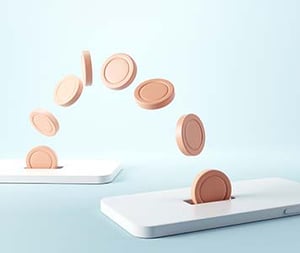A patent as a strategic currency
 According to an old Dutch saying swapping something generally leads to tears. Fortunately, this does not hold true in the case of the patent industry. Indeed: a patent is an effective means of exchange with financial benefits for the patent holder. If you hold a patent that someone else needs for their own particular innovation, this will strengthen your negotiating position and will enable you to make money from licences.
According to an old Dutch saying swapping something generally leads to tears. Fortunately, this does not hold true in the case of the patent industry. Indeed: a patent is an effective means of exchange with financial benefits for the patent holder. If you hold a patent that someone else needs for their own particular innovation, this will strengthen your negotiating position and will enable you to make money from licences.
Exchanges in the telecommunications
An example of the power of a patent as a bargaining chip can be found in the telecommunications industry. Smartphones require a great deal of technology that is 'owned' by various different parties. Every manufacturer has to comply with the same standards because phones have to be able to work with each other. The phone on which you may be reading this blog is estimated to have tens of thousands of patents on it or more. These include patents on the software, voice commands, network and communications, battery technologies, touchscreens and much more.
Every manufacturer has come up with something that has become standard for all phones. These manufacturers all have to work together because otherwise there would be no common standard. So this creates a means of exchange; each party has rights to something but also needs another party's rights to be able to market a properly functioning smartphone. This means that everyone has to work together. Moreover everyone gets a piece of the pie because everyone has to pay to use everyone else's rights. So it pays to have a patent in your name, especially when someone else needs it. For example, because it is part of a standard.
Apple makes clever use of patents
Apple was very well aware of the fact that a patent is an attractive means of exchange. They were the first to enter the market with a properly functioning smartphone. At that time Apple had a relatively limited number of telecom-technology related rights. They were not part of the pool of manufacturers that collaborated and set the standard. And because Apple did not yet have a large telecom-related patent portfolio they would in theory have to pay other manufacturers to use their technology.
However, Apple had no intention of doing so. They applied for a huge number of patents on their smartphone technology; graphical user interface, menus and icons. Manufacturers who now wanted to switch to smartphones needed Apple's technology. It was a nice trade-off for Apple to be allowed to use other rights in return. So they very successfully fought their way into the pool of standards, thereby showing that you can open doors by using a patent as a means of exchange
Also interesting for smaller entrepreneurs
So what does this mean for you as an entrepreneur or innovator? You don't have to be a big player like Apple to use a patent as a bargaining chip. As soon as you enter the market with your innovation and you have competitors, you run the risk of getting in each other's way. If a competitor, for example, wants to expand on your basic idea or if you need an existing technology to make your innovation you are in a much stronger position if you have a patent. Then you and your competitor will have to take each other into account. It creates a kind of balance of power. Moreover, with a patent you have something to barter with. For example, by granting a licence. Then your patent will also generate money.
Tips for a patent as a means of exchange
If you feel that your patent could potentially be used as a means of exchange then here are some tips for you:
- Explore whether it would pay to build up a patent portfolio so that you have something to barter with should the need arise.
- Consider what your competitor's protection means for your business. If a competitor improves your product and you do not have a patent on it, there is nothing you can do about it.
- Keep innovating. If you keep innovating, you will keep ahead of the competition. You will then have a bargaining chip in the event that a party comes along that needs your patent to move forward.
- Consider whether your patent is likely to be of interest to your competitors. If you want to use a patent as a bargaining chip, it will only work if there is a level playing field.
Not an end in itself
As you will understand by now, a patent can be a powerful tool as a means of exchange. However, it does not need to be an end in itself; patenting simply to have something to bargain with. That mainly works for the Apples of this world who want to have something that will give them quick access to large amounts of technology. Your average entrepreneur would do well to first find out where the opportunities in the market lie and where they could add value. A patent would provide the necessary protection for that added value. A patent as a means of exchange would then automatically follow when the opportunity presents itself.
If you are considering applying for a patent yourself or would you like advice on how to use your patents as a means of exchange, please feel free to contact me. I would be pleased to help.

About the author
I studied electrical engineering at Delft University and have been a patent attorney at EP&C since 2000. Before that, I worked as a design engineer in defense and aerospace (Delft Instruments) and as...
More about Holger >